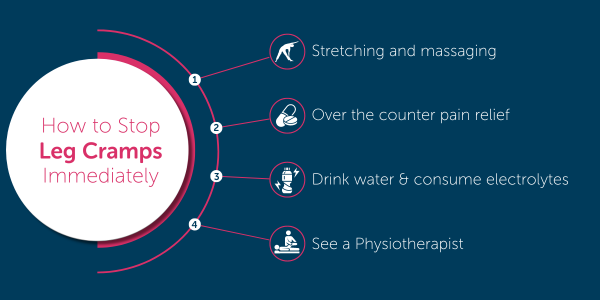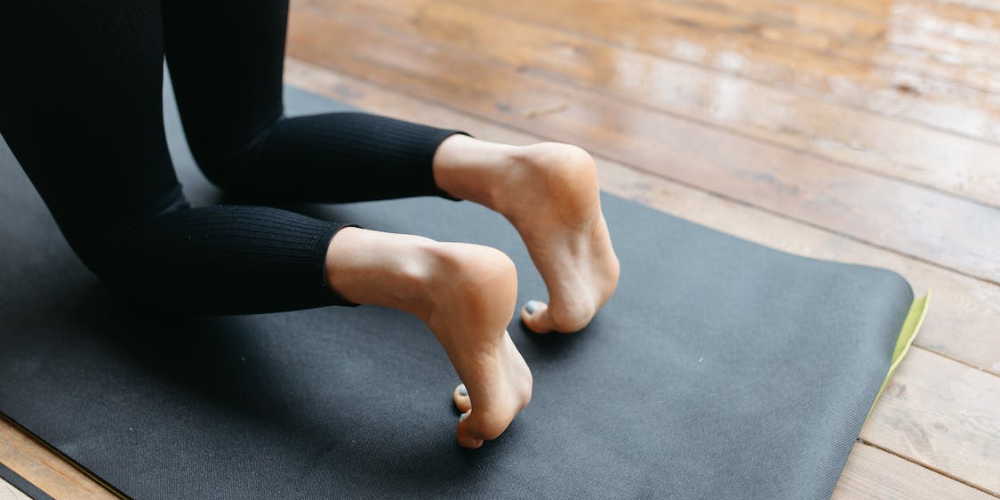Understanding Leg Cramp Causes, Treatments, and Prevention: A Physio’s Guide
Originally Published May 19, 2023
Leg cramps are a common and painful condition that affect many people, often during sleep or after physical activity. Leg cramps are characterised by sudden and involuntary contractions of one or more muscles in the leg, which can last for several seconds to several minutes. The symptoms of leg cramps include severe pain, muscle stiffness, and a feeling of tightness in the affected muscle.
Understanding the causes of leg cramps is important for several reasons. First, identifying the underlying cause of leg cramps can help prevent future episodes from occurring. Second, knowing the causes of leg cramps can help guide appropriate treatment options, including lifestyle changes and medical interventions.
Causes of Leg Cramps
There are several common causes of leg cramps, including dehydration, muscle fatigue, and electrolyte imbalances. Dehydration can occur when the body loses more fluid than it takes in, often due to excessive sweating during physical activity. This can lead to an imbalance of electrolytes, such as sodium and potassium, which are important for proper muscle function. Muscle fatigue, which occurs when the muscles are overused or strained, can also contribute to leg cramps.
Other possible causes of leg cramps include medical conditions such as peripheral artery disease, diabetes, and kidney disease. Certain medications, such as diuretics and statins, can also increase the risk of leg cramps. Additionally, leg cramps can occur as a result of neurological disorders such as multiple sclerosis and spinal cord injuries.
It's important to note that sometimes the cause of leg cramps cannot be identified. These cases are referred to as idiopathic leg cramps.
In the next section, we will discuss some of the causes of leg cramps at night.

Causes of Leg Cramps at Night
Leg cramps often occur at night, typically during the deeper stages of sleep. This is because during sleep, the body is more relaxed, which can make it easier for the muscles to cramp. Additionally, leg cramps at night can be caused by prolonged sitting or standing, which can lead to muscle fatigue and strain. Pregnant women are also at increased risk of leg cramps at night, due to hormonal changes and increased pressure on the leg muscles.
Other specific causes of leg cramps at night may include medical conditions such as peripheral neuropathy, which is nerve damage that affects the extremities, and venous insufficiency, which occurs when the veins in the legs are unable to properly circulate blood back to the heart.

Causes of Severe Leg Cramps at Night
While leg cramps at night can be uncomfortable and painful, some individuals may experience more severe leg cramps that significantly impact their quality of life. Factors that can contribute to more severe leg cramps at night may include dehydration, as this can lead to an electrolyte imbalance that affects muscle function. Nerve damage, such as that caused by peripheral neuropathy, can also increase the severity of leg cramps.
Other possible causes of severe leg cramps include restless leg syndrome, a neurological condition that causes an irresistible urge to move the legs, and peripheral artery disease, which occurs when the arteries in the legs become narrowed or blocked, leading to reduced blood flow.
In the next section, we will discuss some of the treatments for leg cramps.

How to Stop Leg Cramps Immediately
Fortunately, there are several ways to treat leg cramps.
Stretching and massaging:
Stretching and massaging the affected muscle can help alleviate the cramp, while heat or cold therapy can help reduce pain and inflammation.Over-the-counter pain relievers:
Over-the-counter pain relievers such as ibuprofen or acetaminophen may also be effective, while prescription medications such as muscle relaxants or anti-seizure drugs may be recommended for more severe cases.Drink Water & Consume Electrolytes:
Staying hydrated and ensuring adequate intake of electrolytes such as potassium and magnesium may also help prevent leg cramps.Book an appointment with a Physiotherapist:
If your leg cramps occur on a regular basis, or do not subside within 10 minutes, you may need to see a Physiotherapist to identify any underlying issues.At Physio Inq we equip you with the necessary knowledge and tools to maintain your mobility, achieve sustainable results, and live a high-quality life.
You can click here to make an appointment online, or call us directly on 1300 731 733
Whether you suffer from recurring muscle cramps or any other conditions that limit your ability to live life to the fullest, don't hesitate - book your consultation today, either online or in person.

Leg cramps can be a common and uncomfortable experience, but understanding their causes and treatments can help individuals manage their symptoms and improve their quality of life. From dehydration and muscle fatigue to medical conditions and certain medications, leg cramps can have a variety of causes. However, through stretching, massage, heat or cold therapy, and other treatments, individuals can effectively manage their symptoms and reduce the impact of leg cramps on their daily life. If leg cramps persist or are severe, it's important to seek medical attention to rule out any underlying medical conditions.
![]() Written on behalf of Physio Inq
Written on behalf of Physio Inq
Disclaimer
The information provided on this blog is intended for educational and informational purposes only. It is not intended to be a substitute for professional advice or treatment. Always seek the advice of a qualified professional with any questions you may have regarding a medical condition. Never disregard professional medical advice or delay in seeking it because of something you have read on this blog.

